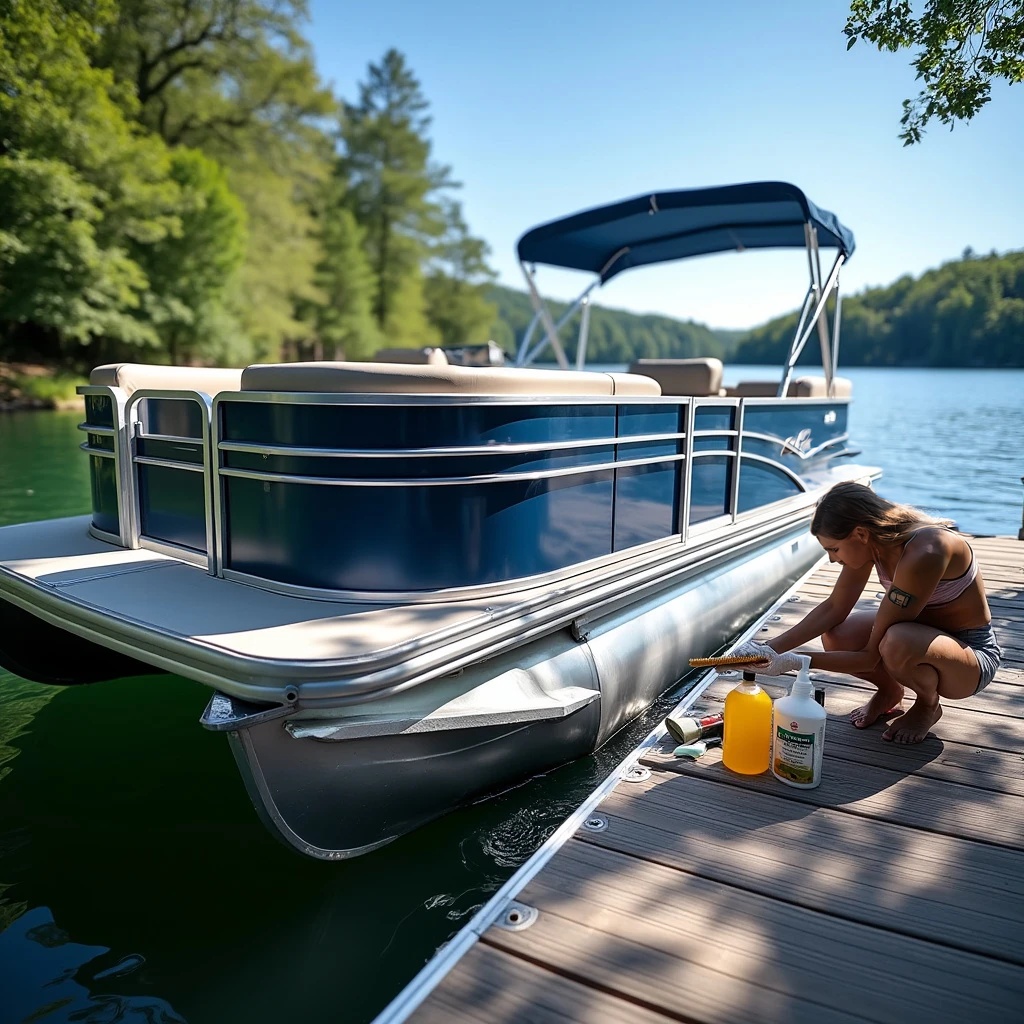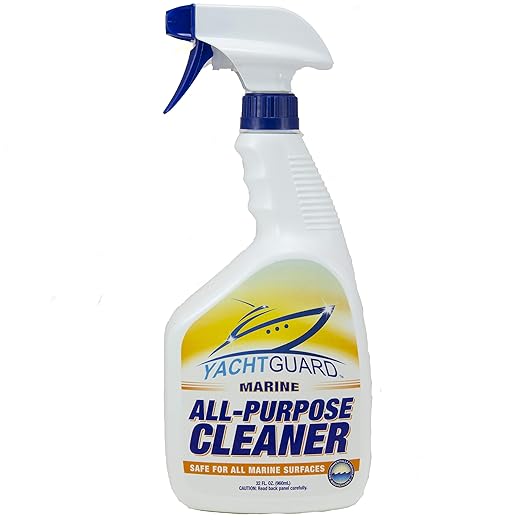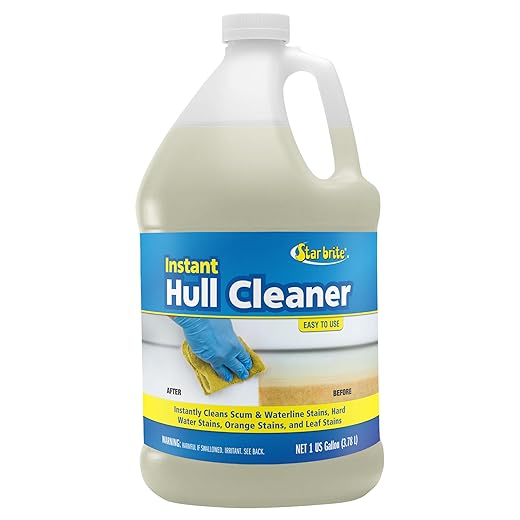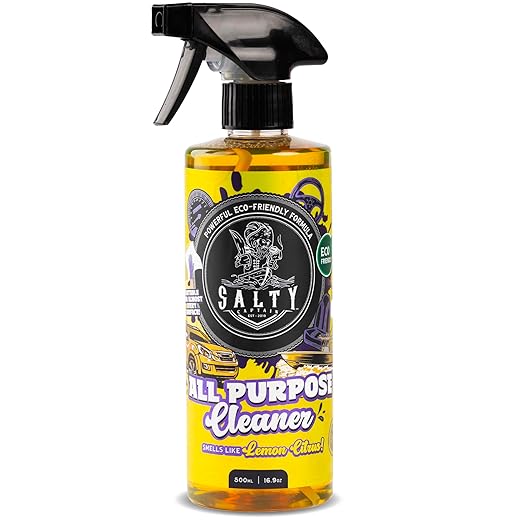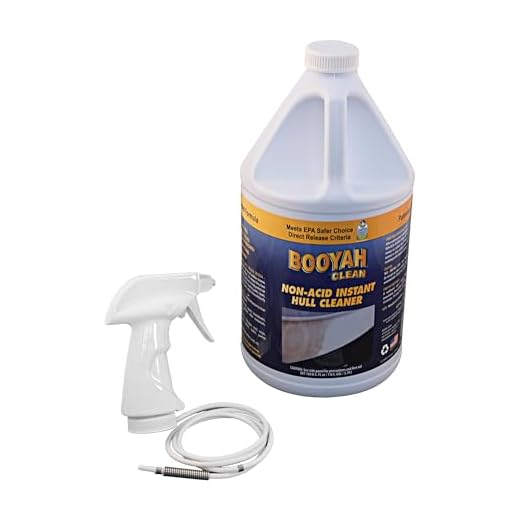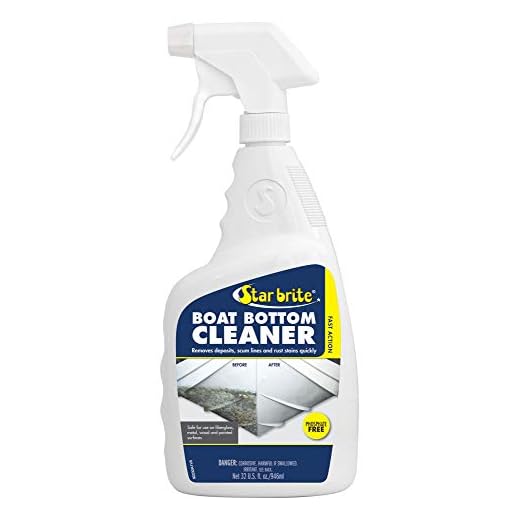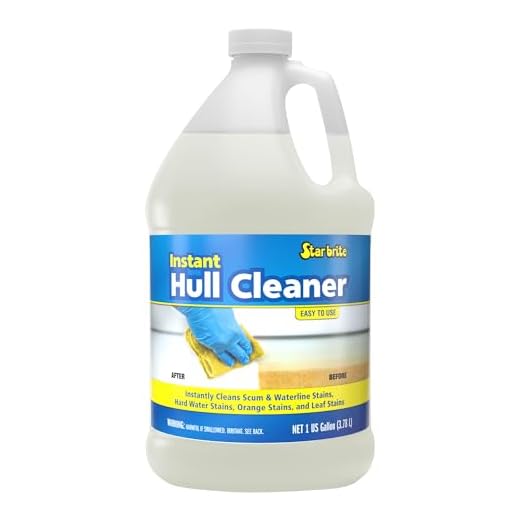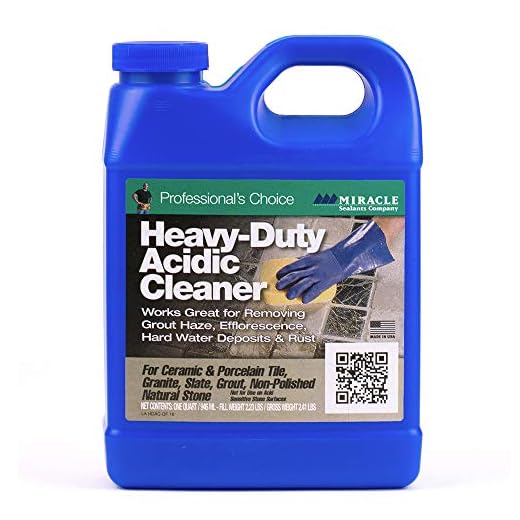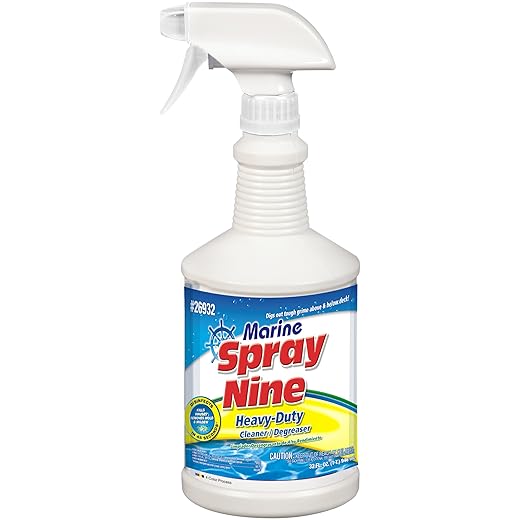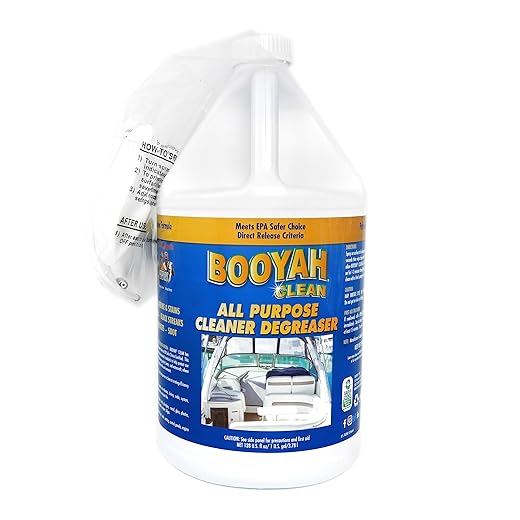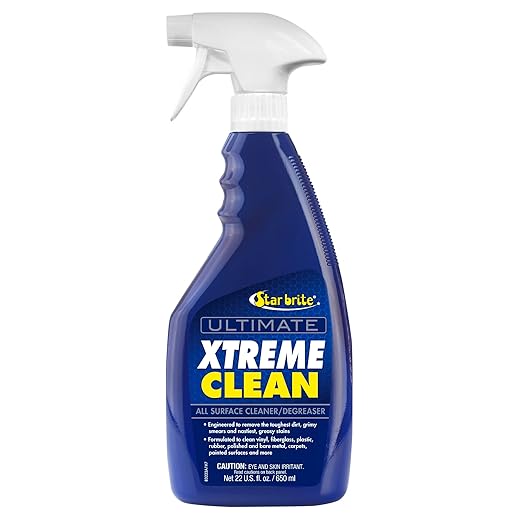Pontoon Boat Maintenance
Keeping Your Pontoon Boat’s Aluminum Clean
Your pontoon boat’s aluminum can be susceptible to oxidation and corrosion due to extended exposure to water and other potentially damaging environmental factors. Thus, it is important to keep your boat’s aluminum clean to ensure its longevity and aesthetic appeal. Clean aluminum prevents corrosion from spreading further, which can help you avoid extensive and costly repair and replacement expenses.
Benefits of Regular Cleaning and Maintenance
Regular cleaning and maintenance are key to preserving the life and performance of your pontoon. Cleaning your boat at least once a season helps to maintain its appearance, improve safety, and avoid problems associated with an unsanitary boat. Failure to clean your boat’s aluminum can lead to irreversible damage and boat depreciation, caused by dirt, grime, and contaminants.
Tools and Materials You’ll Need for Cleaning Aluminum
Before you begin cleaning your pontoon’s aluminum, there are a few essential tools and materials you’ll need to get the job done. These include non-abrasive cleaners, microfiber cloths, water hose or pressure washer, scrub brushes, protective gloves, boat soap and wax, and aluminum brightener. We’ll take a closer look at the tools and materials you’ll need in section IV.
Aluminum on Pontoon Boats
Aluminum is the dominating material used in pontoon boats because of its lightweight property, durability, and corrosion resistance. Compared to steel and wood, aluminum requires less maintenance since it does not rust and deteriorate. In this section, we will discuss the characteristics of aluminum and some challenges of cleaning and preventing oxidation on aluminum surfaces.
Why Aluminum is Used in Pontoon Boats
Most pontoon boats on the market are made of aluminum. This is because aluminum boasts strong material properties that enable it to support the weight of a boat while remaining lightweight. Unlike other materials, aluminum is highly resistant to saltwater corrosion, making it ideal for use on marine structures. Additionally, aluminum pontoons are highly resistant to UV rays, providing great protection against weathering and sun damage.
Common Challenges in Cleaning Aluminum Surfaces
Despite its durability, aluminum can react to environmental factors such as humidity and saltwater. This can cause oxidation buildup that appears as powdery white deposits. Removing these stains may require a bit more effort than ordinary cleaning, and if left unnoticed, they can damage the aluminum surface. Using improper cleaning agents can also cause etching and streaking on the surface.
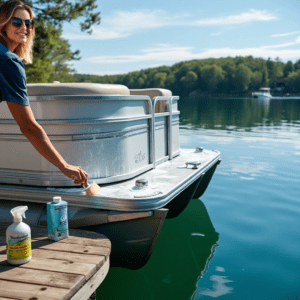
Another challenge in cleaning aluminum is the presence of mildew on the surface. Mildew thrives in damp, warm conditions, which are ideal for pontoon boats. Removing mildew from aluminum requires the use of specific cleaners and techniques to avoid damaging the surface.
Preventing Aluminum Corrosion and Oxidation
The best way to prevent aluminum corrosion and oxidation is to keep your pontoon boat clean. Rinse your boat with freshwater from the hull upwards after each use to remove salt or mineral deposits that may accumulate on the surface. Regular waxing also provides an added layer of protection against rust, oxidation, and UV rays. Covering your boat when not in use can also help to prevent oxidation buildup and other forms of damage to the aluminum surface.
It’s also recommended to avoid using abrasive cleaners, scrub brushes, or steel wool when cleaning the aluminum surface. Instead, use mild, non-acidic cleaners and a soft-bristled brush to avoid scratching the surface.
BooYah Clean Non-Acid Instant Hull Cleaner – Removes Water and Scum Lines, Fish Blood, and Tannin Stains – Meets EPA Safer Choice Direct Release Criteria
By understanding the characteristics of aluminum and the challenges of cleaning aluminum surfaces, you can develop a maintenance routine that prolongs the life of your pontoon boat and enhances its appearance.
Step-by-Step Guide to Cleaning Your Pontoon’s Aluminum
Pontoon boats are a great investment and keeping them maintained is essential to prolong their life and maintain their appearance. An integral part of maintaining a pontoon boat is cleaning the aluminum surfaces. In this section, we will provide you with a step-by-step guide to cleaning your pontoon’s aluminum.
A. Preparation Before Cleaning
The first step to cleaning your pontoon’s aluminum is preparation. Before you start cleaning, you need to make sure that you have all the necessary materials and tools at hand. Here are the things that you will need:
- Bucket
- Hose
- Non-abrasive scrub pads or microfiber towels
- A mild aluminum cleaner
- A soft-bristled brush or sponge
- A polishing compound
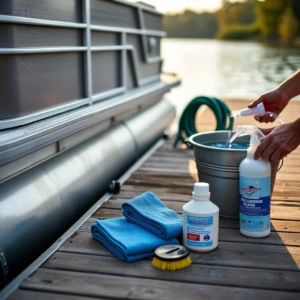
B. Rinsing and Washing the Aluminum Surfaces
The next step is to rinse the aluminum surfaces with a hose to remove any loose dirt and debris. Then, use a mild aluminum cleaner and a soft-bristled brush or sponge to wash the surfaces. Scrub in a circular motion to avoid scratches on the surface. Rinse the surfaces again with a hose to remove all traces of the cleaner.
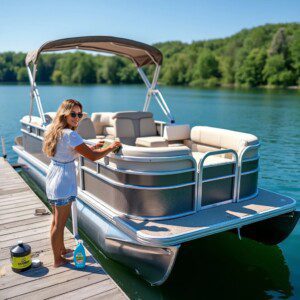
C. Treating Stains and Discoloration on Aluminum
If there are any stains or discoloration on the aluminum surfaces, use a non-abrasive scrub pad or microfiber towel with a polishing compound to remove them. Gently rub the stained areas in a circular motion until the stains disappear.
D. Polishing and Restoring Shine to Aluminum
After cleaning the aluminum surfaces, use a polishing compound to restore their shine. Apply the compound to a soft polishing pad and rub it in a circular motion over the aluminum surface. Keep rubbing until you achieve the desired shine.
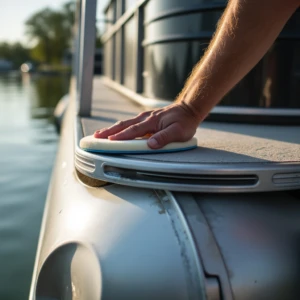
E. Drying and Protecting Aluminum After Cleaning
Finally, dry the aluminum surfaces with a soft towel to avoid water spots. After drying, protect the aluminum surfaces by applying a protective coating like wax or sealant. This will prevent the aluminum from corroding over time.
By following this step-by-step guide, you can easily clean and maintain the aluminum surfaces of your pontoon boat, ensuring that it stays in top condition for years to come.
Best Products and Solutions for Aluminum Care
A. Review of Safe Cleaning Agents for Aluminum
The selection of the right cleaning agent is essential for the proper maintenance of aluminum. It is always recommended to use pH neutral or mild alkaline cleaning agents to avoid oxidation and corrosion. You can use household detergents that are free from harsh chemicals and acids. However, it is advisable to use specialized aluminum cleaners for tough stains or discolorations. Some of the best cleaning agents are:
- Star Brite Ultimate Aluminum Cleaner
- Simple Green Marine All-Purpose Boat Cleaner
- Meguiar’s Heavy Duty Oxidation Remover
- Boeshield Aluminum Prep Wash
B. Comparing Tools for Effective Aluminum Cleaning
Using the right tools is crucial for effective cleaning of aluminum without damaging the surface. Soft-bristled brushes and sponges are recommended for gentle cleaning, while power washing or abrasive brushes should be avoided. Some of the most effective tools for cleaning aluminum are:
| Tool | Pros | Cons |
|---|---|---|
| Soft-bristled brush | Gentle but effective | May take more time |
| Microfiber cloth | Gentle and safe | May leave streaks |
| Power Washer | Effective for tough stains | May damage the surface if used incorrectly |
C. The Role of Wax and Sealants in Aluminum Protection
Waxes and sealants play a vital role in protecting aluminum surfaces from corrosion, oxidation, and UV rays. Waxing creates a protective layer that prevents stains and grime from sticking to the surface. Silicone-based sealants protect aluminum from water and humidity, which cause corrosion and oxidation. Some of the best wax and sealant products for aluminum protection are:
- 3M Marine Ultra Performance Paste Wax
- Boeshield T-9 Rust and Corrosion Protection
- Collinite 850 Liquid Insulator Wax
- 303 Aerospace Protectant
By selecting the right cleaning agents, tools, and sealants, you can maintain the shine and durability of your pontoon boat’s aluminum surfaces. Proper maintenance will also prevent corrosion and oxidation from deteriorating the structural integrity of your boat.
| Category | Key Data Points | ||||||||||||
|---|---|---|---|---|---|---|---|---|---|---|---|---|---|
| Cleaning Agents |
| ||||||||||||
| Cleaning Tools |
| ||||||||||||
| Wax and Sealants |
|
Maintenance Tips and Best Practices for Pontoon Owners
As a pontoon owner, it’s important to develop a regular cleaning and maintenance schedule to keep your aluminum surfaces in good condition and increase the lifespan of your boat. Here are some tips and best practices:
A. Developing a Regular Cleaning Schedule
- Wash your pontoon regularly with soap and water to remove dirt, debris, and salt build-up.
- Use a mild, non-abrasive cleaner specifically designed for aluminum, and avoid harsh chemicals that can damage the surface.
- Consider using a power washer with low pressure to remove tough stains and grime.
- Dry your pontoon thoroughly after cleaning to prevent water spots and corrosion.
- Incorporate pontoon cleaning into your overall boating maintenance routine.
B. Addressing Aluminum Pontoons in Different Water Types
The type of water your pontoon is in can impact the cleanliness and maintenance required for your aluminum surfaces. Here are some considerations:
- Freshwater: While freshwater is less corrosive than saltwater, it can still lead to algae and mineral build-up on your pontoon. Regular cleaning and maintenance is still necessary.
- Saltwater: The salt in seawater can corrode aluminum, so regular cleaning is essential. Consider a protective coating to prevent saltwater damage.
- Brackish water: Brackish water is a mixture of freshwater and saltwater, and may require special cleaning and maintenance practices.
C. Long-Term Storage and Winterization of Aluminum Pontoons
Properly storing your pontoon during the offseason is crucial in maintaining its longevity. Here are some best practices:
- Store your pontoon in a dry, covered area to prevent exposure to the elements.
- Clean your pontoon thoroughly before storage to prevent damage and corrosion.
- Consider adding a protective coating or wax to protect your aluminum surfaces during storage.
- Perform regular maintenance during the offseason to keep your pontoon in good condition for the next boating season.
D. Troubleshooting Common Aluminum Cleaning Issues
Despite regular cleaning and maintenance, you may encounter some issues with your aluminum surfaces. Here are some troubleshooting tips:
- Rust stains: Use a phosphoric acid-based cleaner to remove rust stains from your aluminum surfaces.
- Water spots: Use a mixture of vinegar and water to remove water spots from your aluminum surfaces.
- Oxidation: To remove oxidation, use a specialized aluminum polish and follow the manufacturer’s instructions.
- Corrosion: If you notice signs of corrosion on your aluminum surfaces, seek professional repair services to prevent further damage.
FAQs:
Q: What’s the best way to prevent saltwater damage on aluminum surfaces?
A: Consider adding a protective coating to your aluminum surfaces, such as an anodized coating or clear protective film. Regular cleaning and maintenance is also important to prevent corrosion.
Q: Can I use any cleaner on my aluminum surfaces?
A: No. Harsh chemicals can damage your aluminum surfaces. Use a mild, non-abrasive cleaner specifically designed for aluminum.
Q: How often should I clean my pontoon?
A: Regular cleaning is important to prevent corrosion and keep your aluminum surfaces in good condition. Consider incorporating pontoon cleaning into your overall boating maintenance routine.

